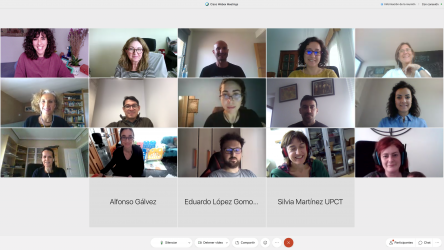The Spanish team of the Diverfarming project analyse the first results of their trials in their national meeting
Four years since the start of the European Diverfarming project, which seeks a change in paradigm in European agriculture through crop diversification and sustainable farming practices, the team of Spanish partners held their annual meeting online.
 In the annual meeting of the Mediterranean – South Region, coordinated by the professor from the University of Cordoba, Beatriz Lozano, they have been able to assess the first results of their case studies that have been trialling diversification and the use of sustainable farming practices for the last three years.
In the annual meeting of the Mediterranean – South Region, coordinated by the professor from the University of Cordoba, Beatriz Lozano, they have been able to assess the first results of their case studies that have been trialling diversification and the use of sustainable farming practices for the last three years.
The most noteworthy environmental benefits include the reduction in soil erosion in the trials, such as in case study 1 where they introduced capers and thyme among the alleys of a dryland almond orchard; or the increase in nitrogen in the soil due to the introduction of legumes in the alleys of the mandarin trees in case study 2; or among horticultural products such as melon or broccoli. In that case it was possible to reduce the nitrogen fertilisation by 30% thanks to the contribution of the legumes and, additionally achieve a double harvest of broad beans. The diversifications have supposed, moreover, an increase in the biodiversity and in pollinisers, which are determinant for production.
The double harvests obtained in some of the case studies have also presented interesting results for the research and agricultural community: the thyme sown among the almond trees gave a yield of seven litres of essential oil per hectare and the vetch sown among the olive grove alleys gave yields of almost 3,000 kg per hectare.
Even if the economic benefit for the growers has yet to increase, it did not fall, and they would be playing an essential role in conserving ecosystems and resources such as the soil. For that reason, the team raised the issue of the need to create stamps and certifications endorsing those farmers who carry out these more sustainable practices.
The creation of a ‘Diverfarming Community of Practitioners’ which began to implement these practices continues with the communication and strategy work put forward by the Unit of Scientific Culture and Innovation at the University of Cordoba, which also presented the results of informing about and disseminating the project.
Throughout the day, the institutions working within this project financed by the European Commission’s H2020 programme (University of Cordoba, Asaja Murcia, Disfrimur Logística, Industrias David, CSIC, Cooperativa San Licer) coordinated by the University of Cartagena, also laid down the future lines that they will follow for the remaining year and a half of the project. They will centre their efforts on the transfer and communication of the project’s results, with the objective of implementing these sustainable techniques in the European agricultural sector under the premise of “agriculture that looks after the planet”.
Diverfarming is a project financed by the Horizon 2020 Programme of the European Commission, within the challenge of “Food Security, Sustainable Agriculture and Forestry, Marine, Maritime and Inland Water Research and the Bioeconomy”, which counts on the participation of the Universities of Cartagena and Córdoba (Spain), Tuscia (Italy), Exeter and Portsmouth (United Kingdom), Wageningen (Netherlands), Trier (Germany), Pecs (Hungary) and ETH Zurich (Switzerland), the research centres Consiglio per la ricerca in agricoltura e l'analisi dell'economia agraria (Italy), the Consejo Superior de Investigaciones Científicas (Spain) and the Natural Resources Institute LUKE (Finland), the agrarian organisation ASAJA, and the companies Casalasco and Barilla (Italy), Arento, LogísticaDFM and Industrias David (Spain), Nieuw Bromo Van Tilburg and Ekoboerdeij de Lingehof (Netherlands), Weingut Dr. Frey (Germany), Nedel-Market KFT and Gere (Hungary) and Paavolan Kotijuustola and Polven Juustola (Finland).










